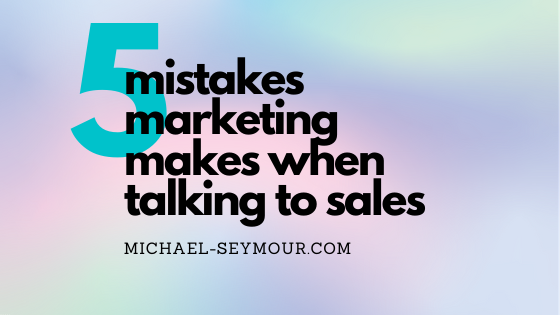In this post, we are going to cover common mistakes marketing makes when talking to sales. I am taking a breather from the messaging posts as they are a lot more work than I anticipated, and I have a vacation coming up.
Marketing often misses the mark when talking to sales
If you spend time with sales reps, you will quickly learn they usually have a strong distaste for interacting with marketing. While there is a bevy of reasons for this, a top one is marketing doesn’t understand what sales needs to know. This lack of ability to communicate to sales from marketing is a crucial barrier to marketing-sales alignment. So what are the five mistakes marketing makes when talking to sales?
Reason 1: Too much fluff
Too much fluff is probably the main reason that marketing fails in communicating with sales. To some reps, marketing will fill their time with things that just don’t matter, or are irrelevant. Sales reps often have very short attention spans, and the fluff causes them to start playing candy crush or doing emails.
Some examples of this are
- Too much credentialing – Don’t go through your entire resume on why you should be speaking to them. Don’t skip credentialing, but chances are you wouldn’t be in front of a sales rep, whose time is valuable if you weren’t worth listening to.
- Jokes, irrelevant stories, or long drawn out explanations – Now, a well timed joke is gold, as it engages listeners, but it has to be well-timed, funny and to the point. A joke just to make a joke, or a story or a long drawn out explanation are just a waste of time.
- Happy talk – Yeah, morning show broadcasters and DJs love the happy talk. Happy talk or the light banter broadcasters make, can be excellent. But remember they are professional broadcasters, and chances are you are not.
Reason 2: Lack of actions
While fluff permeates much of what marketing talks about, lack of action is often at the core of what marketing wants to talk about. When you speak to sales, you need to make sure it’s action-oriented and not “FYI.” FYI updates often go in one ear and out the other. I understand that marketing wants to make sure that sales know everything they are doing for them. But if they can’t act on it, they will tune out. And then the next time you talk, they will also tune you out.
Reason 3: Too much detail
This reason overlaps with the fluff but is distinctly different in that it is likely relevant to the conversation. One time during an enablement update, we were talking about a new campaign that was dropping. Marketing ops explained the segmentation strategy and then discussed various options they considered when segmenting the customer base. The wrap up was covering which accounts were targeted.
It was interesting…..to me. But I could tell we lost sales when the marketing ops lead started covering the topic. Instead, she should have said – we segmented the base and sent you an email on the accounts of yours we are targeting.
Sales reps only need the basics to take action; you can follow up on detail in an email in the off chance they are interested.
Reason 4: Leaving key questions unanswered
Marketing is often excited to announce critical initiatives. Marketing is often far more work than most people realize, and marketers can be prone to overexcitement. I know I am. Anyway, you need to make sure you have the basics before going to sales.
A great example I ran into was when I was prepping the field for an annual user conference. Sales knew this was a closing event and was keen to start engaging with prospects. Marketing recognized this, and they went to talk to sales too early. They didn’t have a ton of detail locked down, such as event pricing, that sales needed to know to take actions. Sales left the update quite annoyed.
Reason 5: Talking too much and not listening
Well, this is pretty much a problem in all communication. The reality is that marketing should listen to sales as much as they talk. Take the time to reach out to sales and listen to their problems. Try to develop a relationship. It will help you be a much better marketer.

